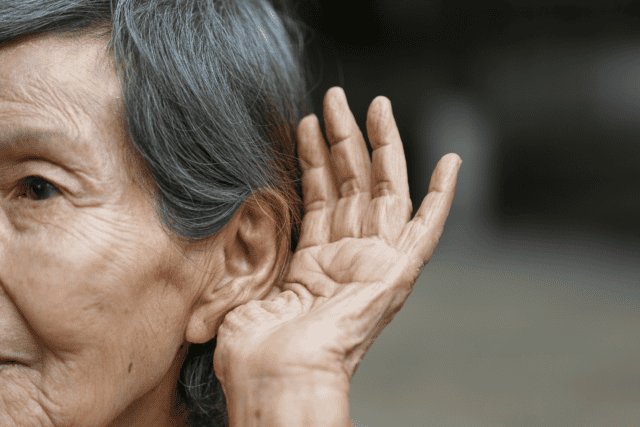
Article by Hearing Partners, contributed by Sadrina Shah, Senior Clinical Audiologist at Hearing Partners
High-frequency hearing loss is one of the most common types of hearing loss, and is often linked to aging and exposure to loud noises.
Individuals with this condition may struggle to hear high-pitched sounds, meaning that it can be hard to distinguish consonants like “s”, “f”, “th” and “sh”. This can lead to difficulties in understanding speech, especially in noisy environments, as speech clarity relies heavily on these high-frequency sounds.
This article will delve into the underlying causes and signs of high-frequency hearing loss. It’ll also explore how this condition is diagnosed and treated, before answering some frequently asked questions.
Causes of High-Frequency Hearing Loss
Various health and lifestyle factors can contribute to the development of high-frequency hearing loss. These factors include:
- Aging: As you age, the tiny hair cells in your cochlea can become damaged, making it difficult to hear higher-pitched sounds.
- Genetics: Some individuals may have a genetic predisposition to high-frequency hearing loss, which can be passed down through their family history.
- Noise exposure: Exposure to loud noises, whether at home, work or in social settings, can result in high-frequency noise induced hearing loss.
- Ototoxic drugs: Certain medications, such as aspirin (in high doses), chemotherapy drugs and certain antibiotics, can be harmful to your hearing health.
- Medical conditions: Various medical conditions, including head trauma, inner ear abnormalities and diabetes, can lead to high-frequency hearing loss.
Signs of High-Frequency Hearing Loss

Certain signs may suggest the presence of high-frequency hearing loss, such as:
- Difficulty keeping up with conversations, especially in noisy environments
- Difficulty hearing higher-pitched sounds, such as women or children speaking, birds chirping or leaves rustling
- Difficulty hearing words beginning and ending with the letters “s”, “f”, “th” and “sh”
- Finding phone conversations unclear
- Turning up the TV too loud
- Difficulty pinpointing the source of sounds
- Ringing in the ears (known as tinnitus)
Diagnosing High-Frequency Hearing Loss
High-frequency hearing loss is diagnosed by an audiologist through a thorough assessment of your hearing capabilities.
The most common hearing test is called pure tone audiometry, which measures the softest sound you can hear across frequencies between 250 Hz and 8000 Hz. High frequency hearing loss is a hearing loss where an individual is unable to hear sounds that occur in the frequency range of 2000 Hz and above.
Further testing with tympanometry, acoustic reflex testing, otoacoustic emissions, as well as speech recognition tests in both quiet and noisy environments may also be conducted to determine the type and severity of hearing loss in each ear.
Treatment for High-Frequency Hearing Loss
Aging and exposure to loud noises often cause permanent damage to the sensory cells in the hearing organ, resulting in irreversible high-frequency hearing loss. To address this condition, hearing aids or cochlear implants are commonly recommended.
Hearing aids
![]()
Hearing aids are often recommended for the treatment of high-frequency hearing loss. They can be adjusted to amplify higher-frequency sounds, effectively addressing this condition. As different hearing aids come with different features and functionalities, your audiologist will recommend the most suitable hearing aid for your lifestyle and condition.
Cochlear implants
Certain individuals may not benefit from hearing aids, such as those with severe or profound hearing loss in higher frequencies but preserved hearing in lower frequencies. In such situations, a cochlear implant may be recommended as an alternative solution.
Cochlear implants use a sound processor placed behind the ear to pick up sound signals from the environment and transmit them to a receiver implanted beneath the skin behind the ear. These signals are then sent to electrodes implanted in the hearing organ or cochlea.
By bypassing the damaged sections of the ear, the implant transmits sound signals directly to the auditory nerve, which then carries them to the brain for processing.
Potential candidates will be required to undergo a series of tests to determine if they’re suitable for this treatment. It’s important to note that this treatment involves surgery, and adapting to the cochlear implants requires 3 to 6 months on average with audio-verbal therapy.
Electric acoustic stimulation
Electric acoustic stimulation involves the simultaneous use of a cochlear implant and a hearing aid. It’s recommended particularly for those experiencing both severe high- and low-frequency hearing loss.
By combining these devices, individuals can address their hearing loss in a more balanced manner, with the cochlear implant assisting with higher-frequency sounds and the hearing aid amplifying lower-frequency sounds.
FAQs About High-Frequency Hearing Loss
Can I leave high-frequency hearing loss untreated?
Timely intervention is crucial for the well-being of those suffering from high-frequency hearing loss. Delayed intervention with hearing aids can lead to poorer outcomes for users.
When someone experiences hearing loss, their auditory system changes over time. If hearing loss is left untreated, the brain can become less efficient at processing sound, making it harder to adjust to hearing aids later on.
Early intervention with hearing aids can help mitigate these negative effects by providing auditory stimulation and allowing the brain to maintain its ability to process sound more effectively. Additionally, prolonged periods of untreated hearing loss can lead to communication difficulties, social isolation, and even cognitive decline and dementia.
It is important for individuals experiencing hearing difficulties to seek professional help as soon as possible to address their hearing loss and prevent further deterioration in their quality of life.
Can high-frequency hearing loss be prevented?
Although certain causes like age and genetics cannot be prevented, there are steps you can take to protect yourself from high-frequency hearing loss. For example, protecting your ears with ear plugs in excessively noisy environments such as concerts, and keeping the volume down on your personal electronic devices is an effective method to safeguard against noise induced hearing loss.
Additionally, scheduling regular hearing tests can play a crucial role in preventing further deterioration of your hearing capabilities.
When should I see a doctor?
In most cases, it’s a good idea to start by seeing an audiologist if you encounter any of the signs related to high-frequency hearing loss mentioned earlier. Audiologists specialize in assessing and treating hearing disorders and are trained to conduct comprehensive hearing evaluations.
However, if you notice that your hearing loss is sudden, asymmetrical, and accompanied by severe tinnitus and/or dizziness, consult with a doctor immediately.
Receiving prompt treatment is essential in safeguarding your current hearing ability and minimizing the advancement of hearing loss.
This is a sponsored post
Digital Health Buzz!
Digital Health Buzz! aims to be the destination of choice when it comes to what’s happening in the digital health world. We are not about news and views, but informative articles and thoughts to apply in your business.


